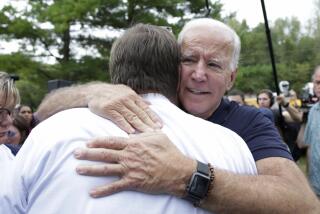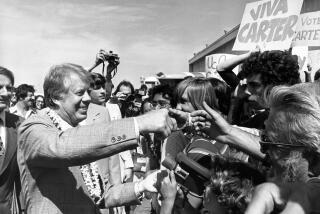Dole Bonds With the Middle Class
He isn’t another Ronald Reagan. That’s not what we wanted--or expected--him to be. But after watching our party’s nominee struggle to connect with the voters, GOP activists have asked one another, in a paraphrase of the recent popular song, what if Bob were one of us? Confident of the ideological distinctions between the two major parties, many Republicans couldn’t help but wonder whether a more articulate and engaged candidate than Bob Dole could be making a better case against Bill Clinton.
Clinton’s greatest strength as both candidate and officeholder has been the voters’ perception that he understands the challenges of their daily lives. When Clinton talks about V-chips and school uniforms and teen curfews, he is not only outlining new responsibilities for the federal government, but also letting concerned parents know that he understands the difficulties of raising children in today’s America. Whether the targeted voter agrees with Clinton’s proposal is almost beside the point. The real goal of this type of discussion is to establish and maintain a personal connection between the president and the parent.
For months, Dole has attempted to establish the same kind of connection with voters by talking about his own struggle to recover from the injuries he suffered in World War II. But his references to events now half a century old seem dated and irrelevant, reinforcing Dole’s image as a candidate out of touch with modern America. About 15 minutes into Sunday night’s presidential debate, however, a different Dole showed up. This Dole used his wit not only to make substantive points of public policy but also to show a more relaxed, genuine side of himself than voters had seen. He acknowledged the role for government in helping those in need and sounded genuine in his concern for senior citizens and children. He attempted to reach out to the next generation of voters, devoting his closing remarks to young people and inviting them to visit his campaign’s home page.
Most important, though, Dole established a personal connection with voters that had been nonexistent in his campaign. And he did it by using his much maligned tax cut proposal. He spoke to them not about abstractions and statistics, but by talking in plain terms about what that money could mean to them.
“To people watching tonight with a couple of kids, a working family, that’s four or five months of day care, maybe a personal computer. It may be three or four months of mortgage payment,” Dole told his audience. “This is not a Wall Street tax cut. It’s a family tax cut.”
Suddenly Dole was not a candidate of the past, struggling to understand today’s world. He was not a Washington politician, lost in the arcane world of economic theory and growth rates. He was, finally, just a man, talking to voters about how he was going to make their lives better.
Equally important to his efforts to bond with the debate audience, Dole also resisted the temptation to mount a slash-and-burn attack on his opponent, openly passing up several opportunities to engage in the kind of verbal hostilities that so many trailing candidates resort to. In front of an electorate tired of politics as a blood sport, the candidate known for his own hatchet-man history stayed on the high road. Even his one swipe at Clinton’s character, in which he noted the incumbent’s history of exaggeration and over-promising, was couched within a story about Dole’s own brother’s similar habit.
Dole’s performance was far from perfect. He mangled sound bites, drifted from topic to topic in his rebuttals and undercut several of his own most substantive arguments with the muttered asides for which he has become notorious. But for the better part of 90 minutes of sharing a stage with America’s first talk show president, Dole came across as presidential in both tone and substance for the first time in this campaign.
As well as he presented himself, Dole did not change the fundamental structure of this race. Post-debate polls still will show Clinton with a double-digit lead. But Dole’s performance made Sunday’s debate the first opportunity for many voters to see this campaign as something other than a foregone conclusion. They will be watching Dole more carefully now, giving him an opportunity that he can use to climb back into the race.
Dole will never be able to out-empathize this incumbent. But reestablishing the bond he created on Sunday night will be his last, best chance for a victory in November. Rather than feeling our pain, in other words, Dole must continue to talk in human terms about healing it.
More to Read
Get the L.A. Times Politics newsletter
Deeply reported insights into legislation, politics and policy from Sacramento, Washington and beyond. In your inbox three times per week.
You may occasionally receive promotional content from the Los Angeles Times.










